Consulting is complex, and too often, consultants find themselves struggling with scattered data, manual processes, and tools that don’t scale.
Spreadsheets and disconnected systems create more ‘busy work’ than actual value delivery. Successful consulting firms need robust platforms that automate workflows, optimize resource allocation, and provide real-time insights into critical business metrics like project profitability, billing efficiency, and team utilization.
That’s why finding the right PSA software for consulting can make all the difference to your operations and revenue.
In this guide, we'll explore what makes the best PSA software for consulting firms, why it's essential for your practice, and our top recommendations to help your consulting business operate at peak efficiency in 2025.
Why do consulting firms need specialized PSA software?
Consulting teams need to do much more than just project management —they need to optimize every aspect of service delivery. A good PSA tool does more than just organize work; it actively improves how the business runs. Here’s how the right PSA software benefits consulting firms:
- Project management: Streamlines the scheduling, assignment, and tracking of tasks so that nothing slips through the cracks. Whether you're managing short-term deliverables or long-term milestones, PSA tools help you keep track of tasks, deadlines, and deliverables, ensuring smooth execution from kickoff to completion.
- Resource management: Knows exactly who’s working on what and where your team’s capacity stands. This helps assign the right consultants to projects based on availability, skills, and workload – without underutilizing talent or overwhelming the team.
- Automation: Automates repetitive tasks like time tracking, approvals, or recurring invoicing, saving time and reducing manual errors.
- Governance: Enforces compliance with policies and ensures processes follow established guidelines for complete transparency and control.
- Revenue recognition: Tracks and recognizes revenue accurately based on project milestones or periods, simplifying financial reporting.
- Invoicing: Generates professional, customizable invoices that reflect billable hours, expenses, and contract terms, ensuring timely and accurate payments.
- Time tracking and billing: Tracks billable hours down to the minute, making invoicing straightforward and error-free.
- Financial management: With capabilities to track budgets, monitor project profitability, and forecast costs, the right PSA software ensures financial clarity across your operations.
- Collaboration: By centralizing communication and file sharing, a PSA tool keeps everyone aligned, whether it's your internal team or your external clients.
- AI capabilities: Leverages artificial intelligence for predictive analytics, resource optimization, and decision support, to improve operational efficiency.
- Customer communication: Provides clients with seamless access to project updates, the ability to share feedback effortlessly, and real-time tracking of invoices, often through a self-service portal.
What should you look for in the best PSA software for consulting?
Finding the right PSA software for your consulting firm is about striking a balance between your operational needs and your growth ambitions. Here are a few must-have features that consultants must prioritize:
Ease of use
A complicated system that’s hard to navigate can slow your consultants down rather than help them. Look for intuitive designs that make client onboarding simple and workflows efficient.
Integration capabilities
The right PSA tool for your consulting business should easily connect with your customer relationship management (CRM) tools, enterprise resource planning (ERP) systems, and other platforms to ensure maximum adoption and avoid the risk of data silos.
Scalability
As your consulting business grows, so will your demands. A good PSA tool should scale seamlessly, supporting more users, projects, and features as needed.
Automation
From billing to workflow automation to approvals to recurring tasks, automation features are key to helping you save time and minimize errors.
Customization
Every consulting firm operates differently. Look for software that allows you to tweak workflows, reports, and dashboards to suit your specific requirements.
Analytics and reporting
Insightful, real-time reports can make all the difference when it comes to tracking key performance indicators (KPIs), spotting inefficiencies, or showcasing results to stakeholders.
Top five PSA tools for consulting teams
In this next section, we shall look at the top five PSA tools for consulting teams and what you need to know before picking the right one for your business.
1. Rocketlane
Rocketlane is a PSA platform designed to optimize project delivery and enhance the customer experience for consulting firms. It offers multiple capabilities to streamline workflows, improve time-to-value, and provide transparent communication between your consultants and customers.
With its focus on efficient customer onboarding and resource management, Rocketlane helps organizations accelerate the project lifecycle while ensuring clients stay engaged throughout the journey.
Key features
Rocketlane is designed to optimize project execution, resource management, and financial oversight for consulting firms. It ensures teams deliver projects on time and within budget while maintaining a high level of client engagement and accountability. Key consulting-focused features include:
- Project management: Rocketlane is designed from the ground up with comprehensive project management capabilities to ensure all projects are streamlined, transparent, and scalable. Its customizable dashboards and reports can help consultants track key metrics while its project and document templates ensure consistency across projects and reduce redundant work.
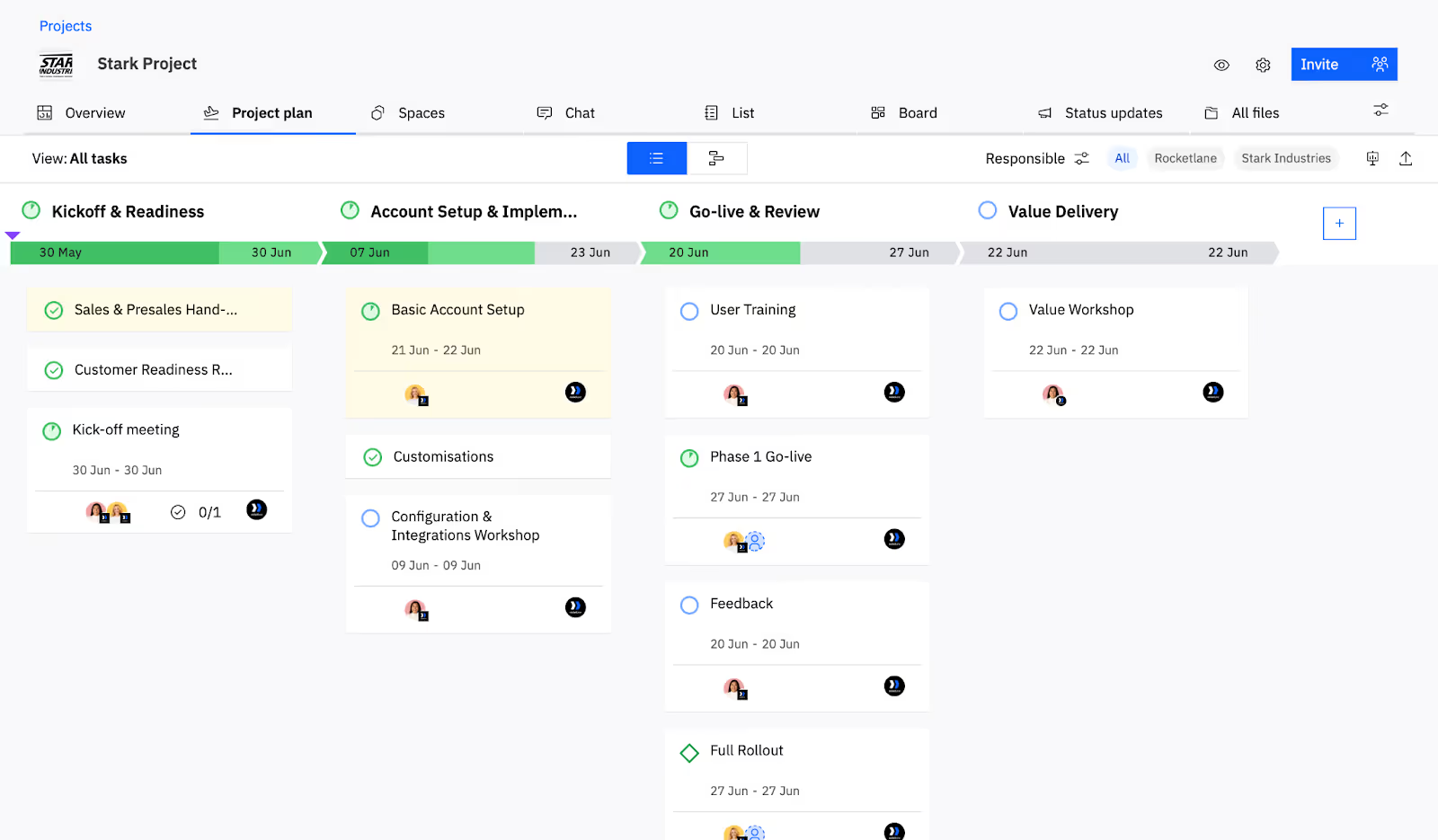
Rocketlane's 360° project view keeps teams informed and proactive – while surfacing timely insights on time-to-value, resource allocation, and project performance for continuous improvement.
- AI-powered resource management and allocation: Rocketlane’s Resource AI helps allocate the ideal team for each project by matching specific skills to project needs. It ensures the right expertise is assigned to each task while maintaining balanced workloads. This feature simplifies resource planning by automatically optimizing team assignments.
It also comes with robust resource management capabilities to plan, schedule, and allocate resources effectively. Features include tracking team members’ work hours, balancing workloads, and ensuring there are no resource overages or shortages.
Rocketlane’s Skills Matrix provides an overview of team members' skills and proficiency levels. This feature is a great value-add for enterprise clients who need to quickly identify the best people for specific projects based on their expertise.
- Branded client portals: Rocketlane’s customer portal keeps clients connected throughout the service lifecycle. It includes features such as integrated chat, real-time notifications, and self-serve sections like FAQs and training materials. Additionally, you can even customize the portal to align with the branding and style of your client.
Financial management: Rocketlane includes comprehensive financial management features so you can manage project budgets, track actual costs, and optimize revenue streams. These include:
- Rate cards and cost rates: Standardize billing and cost rates across projects, tracking costs based on actual utilization of consultants.
- Time tracking and billing: Capture the actual time consultants spent on tasks, and select from fixed fee, time and material, or non-billable billing types for greater flexibility.
- Financial reporting: Gain insights into budget usage, revenue forecasts, and project profitability. Portfolio reports support effective revenue recognition and financial planning across multiple consulting projects.
- Revenue recognition and invoicing: Rocketlane comes with a powerful and flexible revenue recognition system that allows consulting firms to manage their revenue schedule with both automation and customization. Teams can standardize your revenue recognition process by translating unique rules into one streamlined system, ensuring granular control over which hours count toward revenue, whether based on approval status, roles, or departments.
With Rocketlane, only the relevant hours—those that are billable, approved, or aligned with your goals—are recognized, keeping records clean and compliant.
Additionally, Rocketlane seamlessly integrates invoicing, allowing consulting firms to generate accurate, timely invoices based on their revenue recognition rules. This ensures that the billing process is free of manual errors and aligns with the project’s milestones and business objectives across financial operations.
Pros
Here’s why Rocketlane is one of the top PSA tools for consultants today:
- One-stop-shop for delivery teams: Consolidates all projects, resources, finances, and collaboration aspects into one system, enabling seamless management from deal closure to project go-live.
- Customer-centric design: Features a fully customizable customer portal that can be tailored to business needs, acting as a unified hub for clients to access updates, collaborate, and manage their project experience seamlessly.
- Central data hub with actionable insights: Houses all your data in one place, serving as the central source of truth. Its Business IQ feature provides deep insights into project profitability, portfolio performance, time analytics, and team utilization.
- Automation: Rocketlane streamlines project management with customizable templates, automated status updates, and CSAT surveys to keep tasks on track. The project plan feature improves clarity around timelines, ownership, and deadlines, critical for the smooth operation of implementing projects.
- Focus on client collaboration and accountability: Rocketlane emphasizes customer accountability by providing clients with real-time visibility into the progress of their projects. This feature allows clients to track project status directly and communicate with project owners through an integrated chat function. Clients can share files within the chat, and project owners can audit conversations, ensuring that relevant information is shared with the team. This system improves transparency, keeps stakeholders aligned, and promotes better communication throughout the project lifecycle.
- Optimized resource management: Rocketlane’s Resource AI and Skills Matrix make team allocation efficient and ensure a balanced workload.
- Process governance: Streamlines workflows and ensures compliance with standardized processes, reducing errors and inefficiencies.
- AI-driven productivity: Empowers teams to focus on impactful work by
- Generating high-quality project summaries, follow-ups, and updates automatically
- Handling note-taking to free up your team’s time, allowing them to focus on building stronger client relationships.
- Minimizing unbillable tasks and reducing manual errors and repetitive work.
Cons
Some of Rocketlane’s cons as reported by our users include:
- Lack of user behavior analytics: The absence of a user behavior analytics feature or a comprehensive dashboard limits visibility into user engagement and overall project performance.
- Excessive notifications: Some users note that the frequency of notifications can be a bit high, which might lead to information overload.
Customer reviews
With a 4.8/5 rating on G2, Rocketlane is recognized as the #1 easiest-to-use tool in the Professional Services Automation software category.
On TrustRadius, Rocketlane holds a score of 8.8/10 for its efficient resource management and strong project visibility.
Pricing
Rocketlane’s plans start at $19 per team member/month billed annually. You can find the best plan for your team on our pricing page.
Best suited for
Rocketlane is perfect for consulting firms looking for an all-in-one platform to manage their delivery process from start to finish. It's especially great for heavily client-focused companies that are growing quickly and need the right systems and processes in place to keep up with that growth.
2. Kantata (Formerly Mavenlink)
Kantata is a popular professional services automation tool with a user base of over 2,500 customer organizations globally.
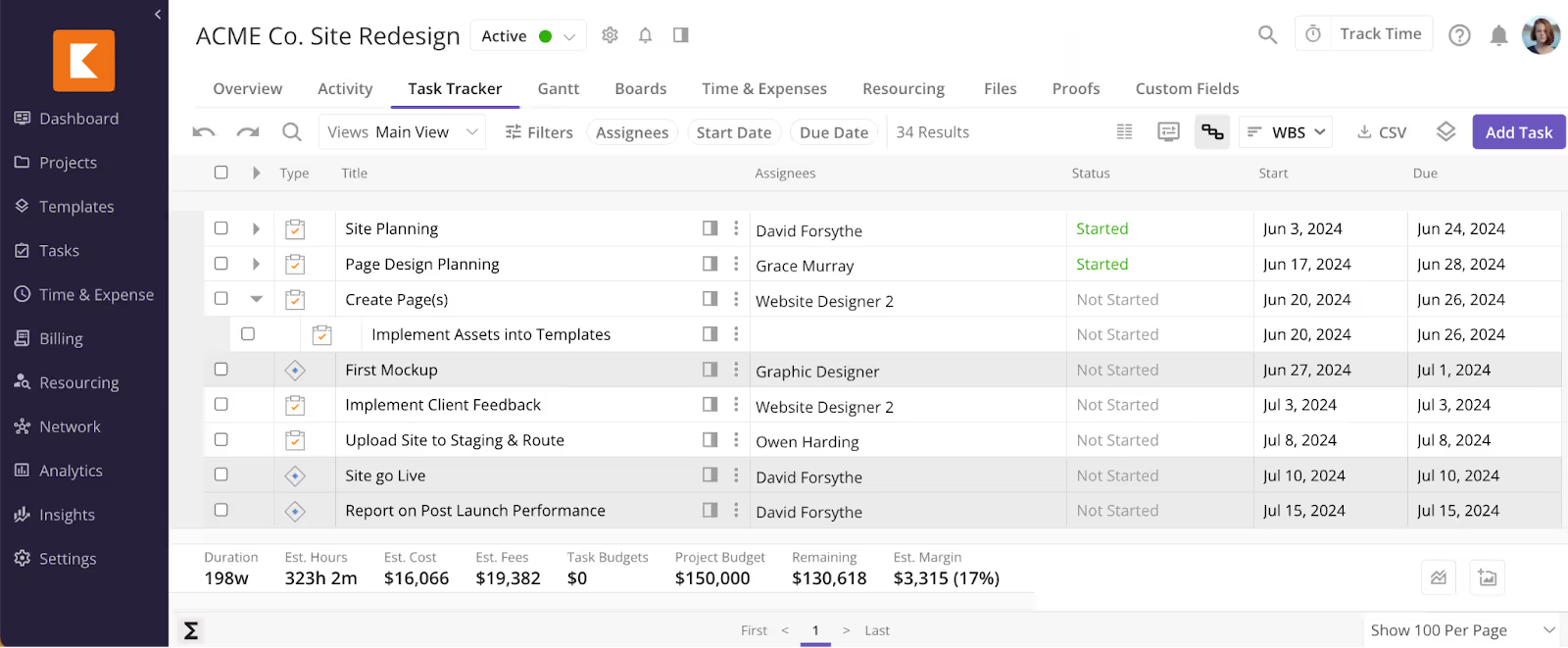
Targeted at mid-to-large-sized service organizations, it streamlines resource planning, operational performance, and project execution. Kantata integrates tools for project management, financial oversight, and team collaboration, so consulting businesses can manage resources effectively, maintain real-time visibility into project progress, and align with timelines and budgets.
Key features
Here’s how Kantata’s PSA capabilities can help consulting teams:
- Resource management: Enables teams to evaluate multiple resource plans simultaneously and assess how resource allocation decisions impact performance and profitability. Facilitates working with external partners by allowing the addition of roles, skills, calendars, and cost rates. Offers tools for time tracking, utilization monitoring, and expense management.
- Financial tracking and reporting: Provides tools for invoicing, revenue recognition, and budgeting
- Business intelligence and reporting: Includes tools to customize and filter data to suit different roles or perspectives. Supports the visualization of metrics through tailored dashboards and reports. Offers over 60 services-focused reports and automated data extraction for integration with external business intelligence tools.
- Customer sentiment and feedback integration: Collects and integrates client and employee feedback during project delivery to provide actionable insights. Combines this sentiment data with operational metrics to offer a comprehensive view of project health and performance.
- Collaboration and communication: Centralizes project communication and enhances visibility for both internal teams and external stakeholders. Offers role-based permissions to control access and streamline collaboration across all parties involved.
- Integration capabilities: Offers compatibility with platforms like Salesforce and over 1,200 prebuilt connectors. Its API-driven workflows facilitate automation across systems, improving operational efficiency.
Pros
Kantata makes it to this list of the best PSA tools for consulting for its:
- Real-time tracking of budgets and project burn rates
- Easy time-entry features simplify timekeeping
- Strong integration with Google Drive for document management
- Detailed forecasting tools help predict task durations and project costs
- Customizable dashboards allow teams to tailor reporting to their specific needs.
Cons
While Kantata offers multiple advantages, there are areas where it falls short, such as:
- Limited project management capabilities: Kantata falls short in a few essential project management features that matter to consultants. For instance, automations incur extra costs, there’s no support for process governance or automated updates, and it lacks customizable views for stakeholders. This can force consulting businesses to adopt additional tools – creating fragmented systems, error-prone manual data entry, and limited visibility into the impact of projects.
- Steep learning curve: Kantata’s complexity makes daily use challenging and slows down team adoption.
- Complex reporting and siloed data: Generating business reports in Kantata often requires coding skills or developer assistance. Siloed data across tools complicates consolidating project, financial, and resource insights, making reporting a time-consuming process. The lack of real-time data also impacts the ability to address bottlenecks, manage project creep, and control budgets effectively.
- Low focus on client engagement: Kantata offers limited capabilities for status updates and sentiment monitoring, limiting its impact on client communication and relationship-building.
- Cumbersome time tracking: Users find time tracking tedious, requiring manual input or the hassle of importing calendar events, making the process unnecessarily complex.
Customer reviews
Kantata receives a 4.2/5 rating on G2 with customers highlighting its analytics, scalability, and ability to centralize project data. Users appreciate its ability to streamline resource and financial management but note challenges such as its steep learning curve and a need for a more intuitive user interface.
On TrustRadius, Kantata has a rating of 8.1/10 with positive mentions of its reporting features and real-time visibility, and negative ones of its complexity for beginners.
Pricing
Pricing is available upon request, with customizable plans tailored to different business sizes and needs.
Best suited for
Kantata is a great fit for mid-market and enterprise consulting organizations that require advanced resource and financial management capabilities.
3. Certinia PS Cloud
Certinia PS Cloud, previously known as FinancialForce PSA, is a Salesforce-native platform that serves over 1,400 customers in more than 30 countries, making it a leading solution for services-driven consulting businesses.
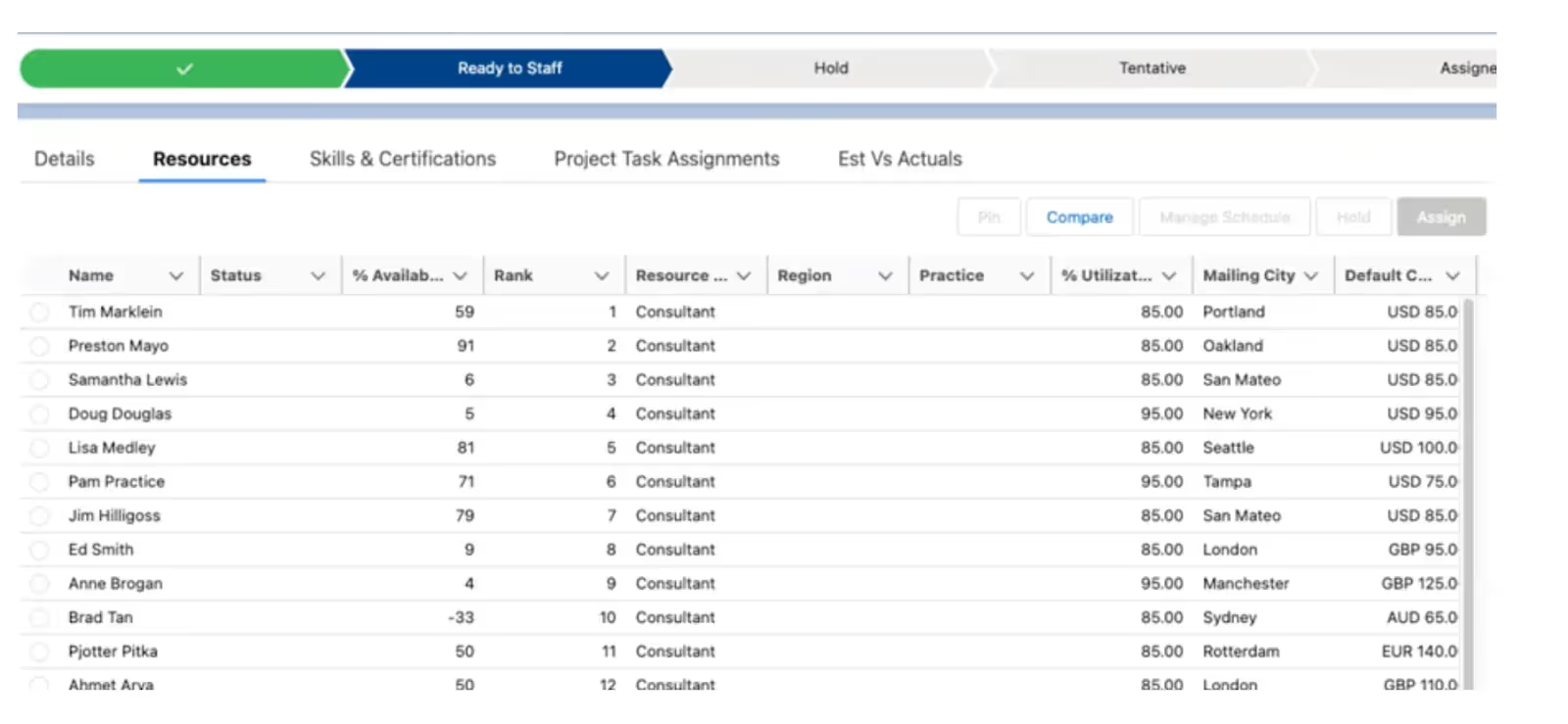
It integrates resource management, project management, financial management, and customer interactions to improve efficiency, profitability, and project outcomes by providing end-to-end visibility and automation across operations.
Key features
Certinia PS Cloud’s key PSA capabilities for consulting include:
- Resource management: This enables the allocation of resources based on skill sets, project requirements, and availability. It helps ensure that teams are appropriately staffed for the work ahead, reducing resource gaps or overstaffing issues.
- Revenue management: This aspect of the platform integrates revenue recognition and forecasting tools, for insights into project financials. By automating tasks related to revenue calculations and scheduling, Certinia PS Cloud helps streamline financial operations, offering clearer visibility into the financial health of projects and reducing risks associated with manual error.
- Project and financial analytics: Its analytics capabilities provide project teams with real-time insights into resource usage, budgets, and profitability. Predictive analytics further enhance decision-making by forecasting potential outcomes, allowing users to adjust plans and resources in real time to meet project goals more effectively.
- Collaboration and integration: The platform integrates tightly with Salesforce for cross-departmental collaboration and ensures that sales, project delivery, and finance teams have access to the same data. This integration supports more efficient decision-making and a smoother handoff between departments.
- Billing and revenue recognition: The platform accommodates a variety of billing models, including usage-based, subscription-based, and fixed-fee arrangements. Automated billing ensures accurate invoicing and compliance with revenue recognition standards.
- Streamlined estimation: Certinia PS Cloud gathers all the necessary details to create accurate and professional estimates for your customers. It automates the process—from quoting and resource allocation to final delivery—helping service companies secure more high-value business opportunities.
Pros
Certinia PS Cloud makes it to this list of top PSA tools for consultants for its capabilities such as:
- Real-time project profitability tracking.
- Strong integration with Salesforce products.
- Robust capabilities for resource and financial management.
- Predictive analytics for better decision-making.
Cons
The shortcomings of Certinia that create difficulties for consulting teams include:
- Limited project management and collaboration capabilities: Certinia lacks features like integrated documents and task-specific conversations. This means that businesses often need to move their project management and collaboration needs to other tools, resulting in fragmented systems and increased inefficiencies.
- Not optimized for customer-facing projects: Since Certinia wasn’t built from the ground up to handle customer-facing projects, it forces consulting businesses to adapt to its workflows and they end up relying on Salesforce communities to keep customers updated, which limits the depth and quality of customer engagement. Without a customizable customer portal, businesses are often forced to use separate tools for customer interactions, duplicating efforts and increasing administrative burdens.
- Ease of use concerns: Users frequently describe Certinia as difficult to navigate, especially for those unfamiliar with Salesforce. Rigid role structures require consulting teams to adjust their workflows, creating unnecessary roles or added overhead.
- Inflexible reporting capabilities: Certinia’s basic reporting tools are limited in scope and often require assistance from Salesforce admins to set up pipelines. The lack of flexibility forces users to rely on spreadsheets for detailed, tailored insights, adding to their workload.
- Cumbersome time logging: Time logging is time-consuming and lacks one-click calendar integrations. Setting up Google Calendar integration requires technical help and comes with long setup times, making time tracking unnecessarily labor-intensive.
- Manual resource management: Resource requests and allocations are isolated from project efforts, requiring manual updates and extra time juggling multiple systems. The absence of a consolidated view of skills mapped to roles adds further challenges in resource planning.
- Complex implementation: Integrating Certinia is a challenging and time-intensive process, particularly for non-technical teams. It often requires reliance on external vendors for support, adding to the overall complexity and effort of consulting projects.
Customer reviews
Certinia PS Cloud has a 4.3/5 rating on G2 with customers highlighting its ease of use and reporting capabilities.
On TrustRadius, it has a rating of 7.0/10 with positive mentions of its flexibility and service features, and some mentions of challenges with planning and overseeing multiple projects.
Pricing
Certinia offers scalable, per-user pricing with bundles or a la carte licenses, allowing consulting businesses to adjust their solution as they grow.
Best suited for
Since it is a Salesforce-native platform, it is ideal for consulting firms catering to enterprise or mid-market firms, as well as existing Salesforce users in the Information Technology (IT) and consulting sectors.
4. Autotask PSA by Kaseya
Autotask PSA is a cloud-based platform designed for IT service management. It provides a comprehensive view of an entire operation, helping businesses improve service delivery, productivity, and profitability. By centralizing multiple tools into one unified workflow, Autotask PSA enables seamless operations and facilitates data-driven decision-making with customizable dashboards and widgets.
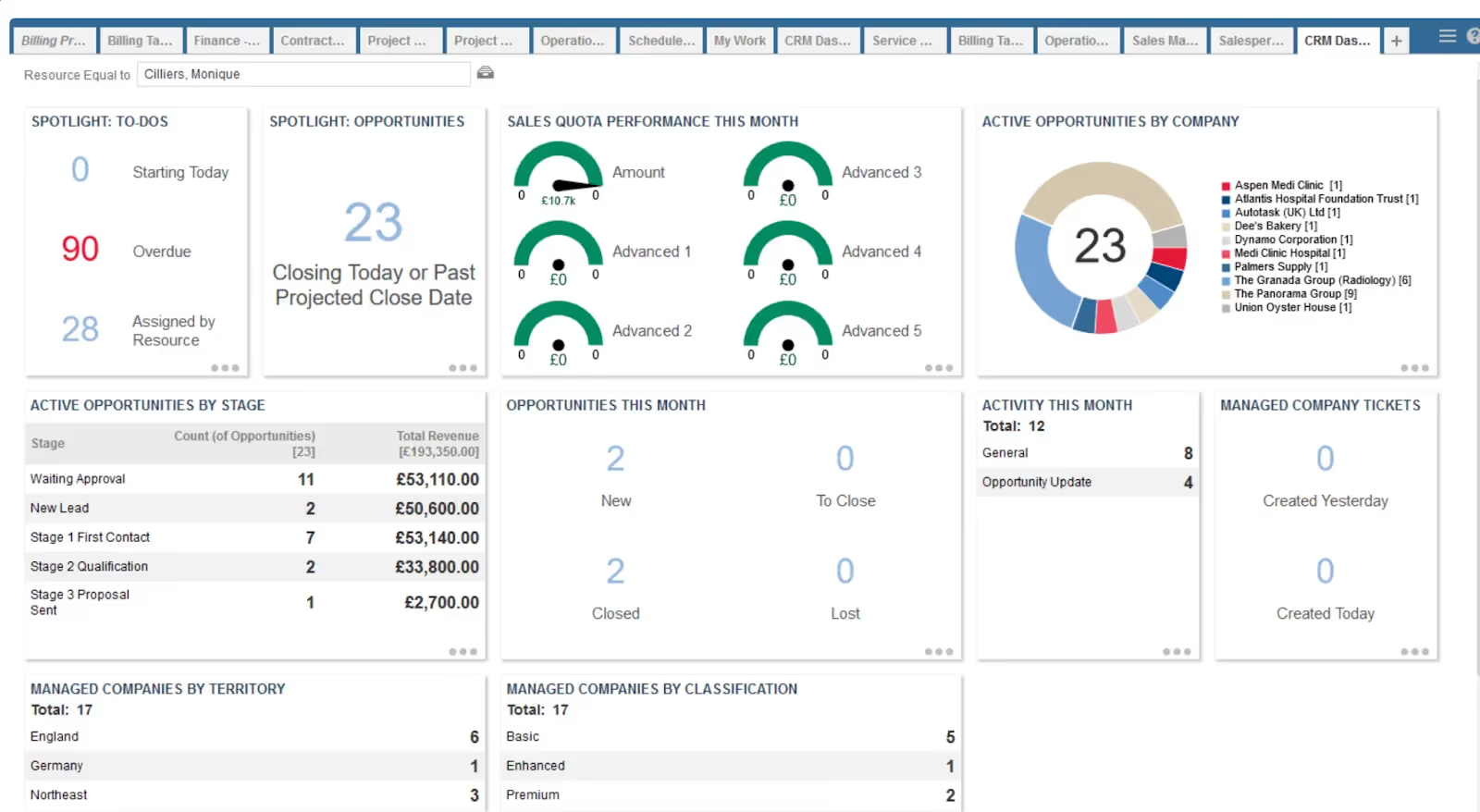
The Autotask platform also offers robust automation for tasks like ticketing and billing, alongside features for centralized alert management, project tracking, and reporting. It caters to the needs of IT service providers and Managed Service Providers (MSPs), integrating with over 250 industry tools to enhance business efficiency.
Key features
Autotask makes it easier for IT service companies to stay organized. Here’s how its comprehensive suite of features streamline operations:
- Automated ticketing workflows: Autotask PSA allows users to automate ticketing processes, reducing manual intervention in common tasks such as ticket creation, routing, and resolution. This ensures issues are addressed quickly, according to preset standards.
- Intuitive project milestone tracking: The platform provides tools to monitor project milestones, allowing teams to track progress against deadlines and ensure that projects remain on schedule. This feature supports proactive management and resource allocation.
- Centralized reporting: Autotask PSA provides real-time visibility into key performance metrics across service delivery. Users can generate customizable reports that help with decision-making, resource planning, and financial forecasting.
- Automated contract-based billing: For IT service providers, Autotask PSA includes flexible contract management and automated billing processes based on usage. This feature ensures billing accuracy, reduces errors, and streamlines the financial operations of service providers.
- Integration with 250+ tools: Autotask PSA integrates with over 250 industry tools, ensuring that businesses can leverage existing software solutions within the Autotask ecosystem.
Pros
Autotask PSA is one of the best PSA tools for IT consulting thanks to its focus on:
- Comprehensive functionality for IT service providers: Autotask’s PSA capabilities are targeted at IT service providers and MSPs, focusing on ticketing, project management, and billing. Its pre-configured workflows and IT-specific terminology enable quick setup and seamless implementation.
- Cost-effectiveness for entry-level companies: The platform offers affordable pricing for smaller IT service businesses or MSPs.
Cons
While powerful, adopting Autotask PSA comes with a few challenges, such as:
- Limited project management capabilities: The platform's project management tools may not meet advanced needs.
- Outdated interface: Some users feel the design lags behind modern software standards.
- Customization challenges: Firms outside of IT consulting will likely find it challenging, as the platform is designed with IT-specific workflows and terminology. These firms may benefit more from a general-purpose solution that can be tailored to their specific needs.
Customer reviews
Autotask is rated 4.2/5 on G2 with users highlighting the platform's reliability and depth of features. It has a rating of 8.7/10 on TrustRadius with feedback focusing on the tool's feature set for IT service providers – with mentions of a steep learning curve.
Pricing
Pricing is available upon request and follows a per-user model.
Best suited for
Autotask’s functionalities and features make it an ideal choice for IT managed service providers (MSPs) with a focus on helpdesk ticket tracking and billing.
5. Accelo
Accelo is a cloud-based PSA platform designed to help consulting and service businesses streamline their operations, from client acquisition to project delivery and payment. This end-to-end approach manages key business processes such as sales, projects, tickets, retainers, timesheets, resourcing, and more.
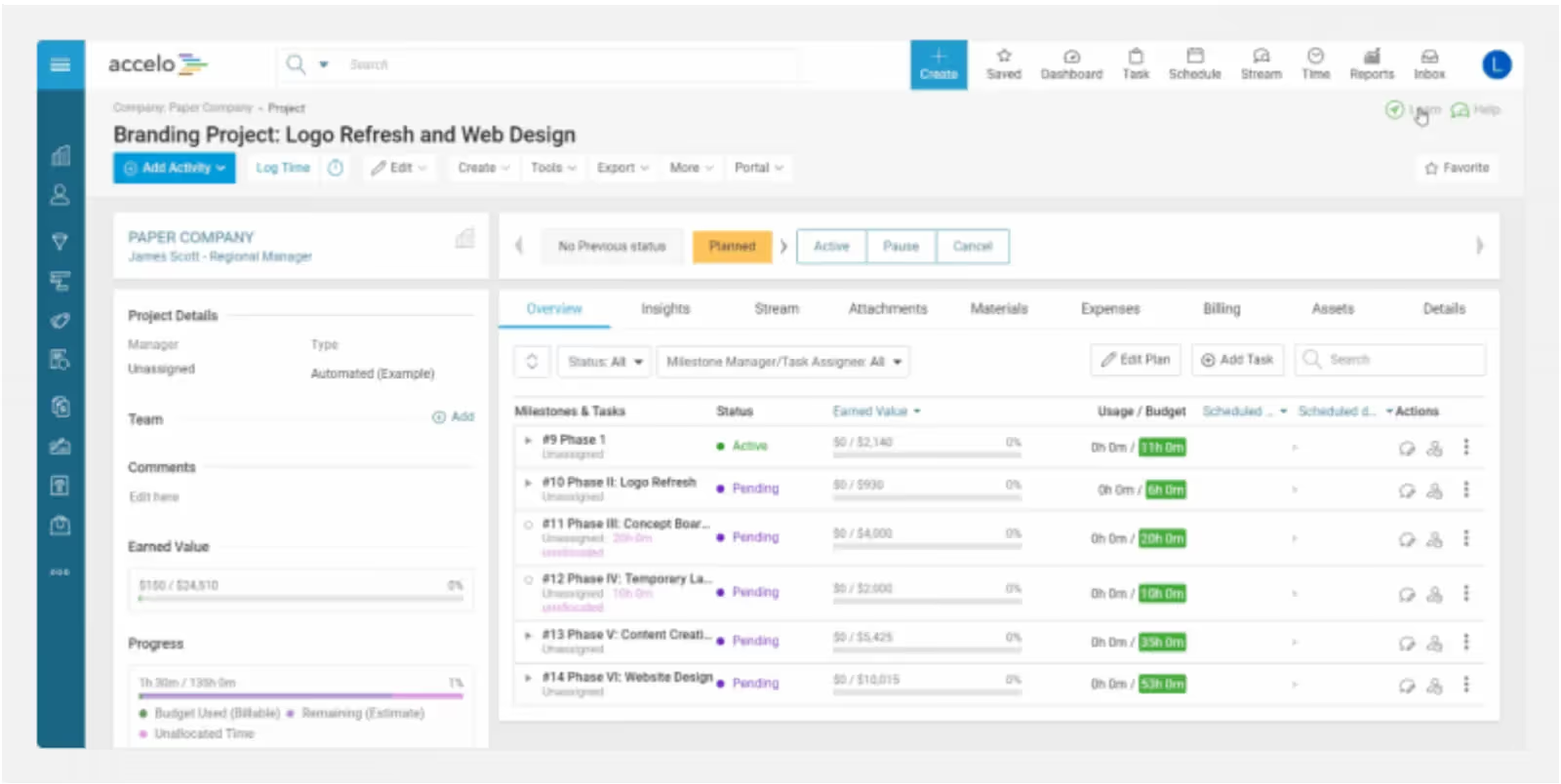
Accelo centralizes business data and client communications, providing a comprehensive view of performance and ensuring that consultants stay aligned and efficient.
Key features
The features that make Accelo one of the most popular PSA tools for consulting include:
- Task and resource management: Accelo provides capabilities for managing tasks, resources, and schedules across projects. This includes Gantt charts, project timelines, and task allocation, making it easier to plan and manage work.
- CRM and client engagement: The platform integrates CRM functionality, allowing users to track client interactions, manage communications, and maintain engagement through centralized data.
- Timesheet and budget management: Accelo includes features for timesheet tracking, budget and expense management, and invoicing. This helps businesses track project costs and time, for better financial control and transparency.
- Automation and workflow management: Accelo offers robust workflow automation tools that simplify processes such as invoicing, client communication, and task assignment.
- Reporting and analytics: The platform supports detailed financial and project reporting, for insights into profitability, time management, and client satisfaction.
- Client collaboration: Accelo’s client portal enables clients to view project progress and communicate directly with the service provider, enhancing collaboration. It also includes a collaborative inbox and change request management for efficient communication and issue resolution.
Pros
Accelo’s key strengths lie in its:
- Comprehensive features: The platform offers an integrated approach to client lifecycle management, which is especially beneficial for small to mid-sized service businesses.
- Focus on client communication: Features like the client portal and shared inbox help improve customer experience and accountability.
Cons
Though a great fit for mid-market and small-sized consulting companies, here are a few of Accelo’s cons to consider:
- Limited customization for enterprises: While well-suited for small to mid-sized businesses, Accelo may not provide the level of customization large enterprises need
- Complex reporting: Some users report challenges in generating, accessing, and customizing reports, particularly when consolidating data across multiple projects. This challenge also extends to reporting for billable versus unbillable/agency time.
- Ease of use concerns: Some users note that performing basic tasks can require navigating through many steps, which may slow down workflow for smaller teams.
Customer reviews
With a rating of 4.4/5 on G2 and 8.0/10 on TrustRadius, Accelo is a competent, feature-rich solution that helps businesses manage multiple aspects of service delivery in one platform.
Pricing
Accelo offers three key professional services management plans: Professional, Business, and Advanced. Each plan is tailored to different business needs, with increasing levels of features designed to support growth and scalability.
Accelo offers three pricing plans: Professional, Business, and Advanced to support different business needs.
Best suited for
Accelo is a great choice for a small-to-medium-sized consulting firm given its easy-to-use features. However, enterprise customers might find customization limited with Accelo.
Over to you
Choosing the right PSA tool for your consulting business comes down to matching the platform to your team's specific needs. Here’s a quick summary to help you:
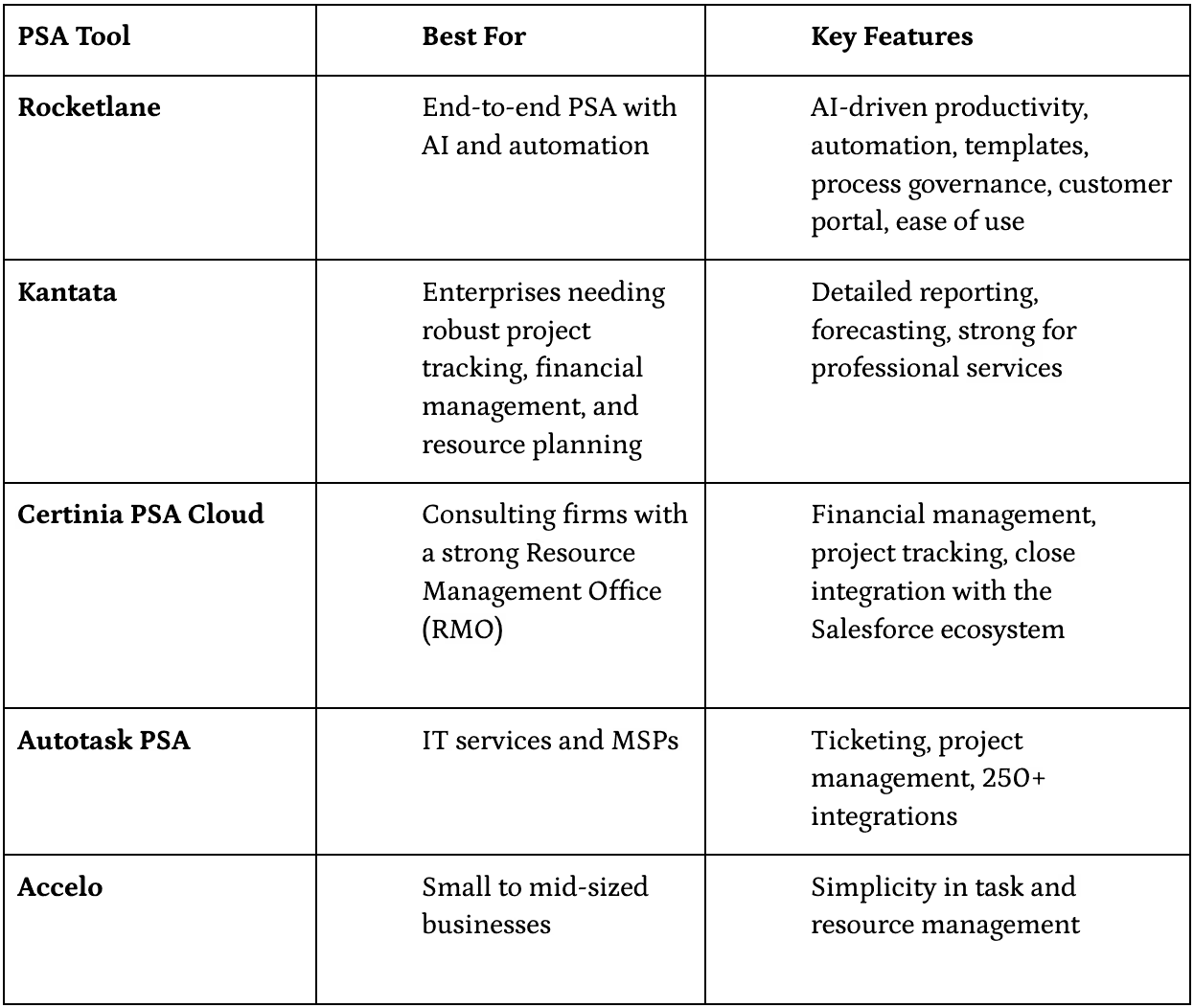
If you need an end-to-end PSA platform for your consulting business, Rocketlane makes the most of AI and automation to improve utilization rates, profit margins, and client satisfaction.
With powerful automation, templates for standardization, AI for productivity, process governance frameworks, and an easy-to-build customer portal, Rocketlane makes a great option for consulting businesses looking to build an intelligent delivery organization
Sign up for a Rocketlane demo to see how it can help you up your consulting game.
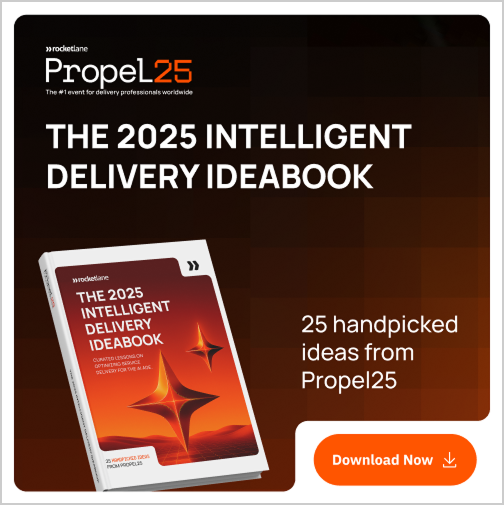





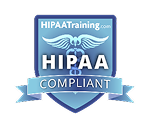
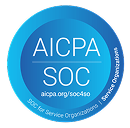
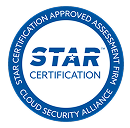
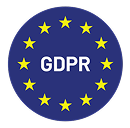
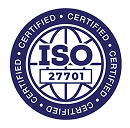









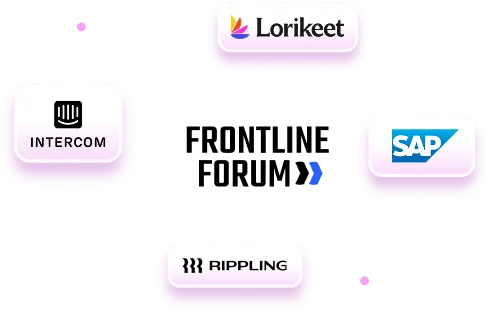
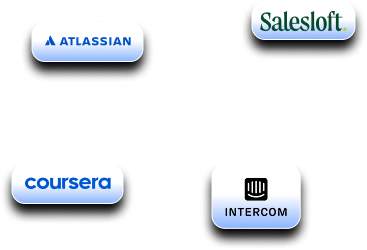

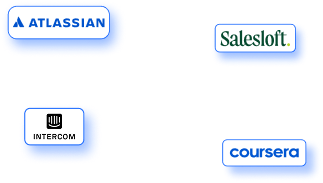
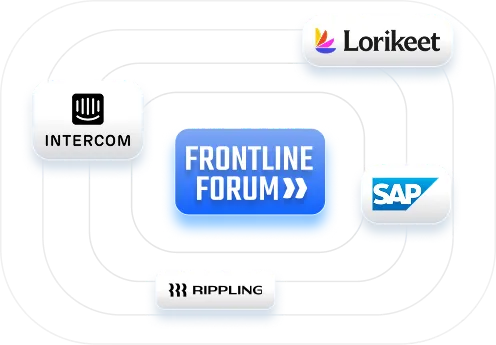
.webp)